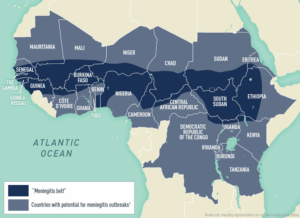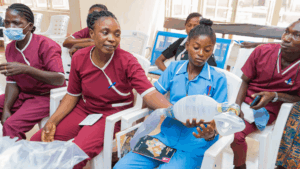
In Nigeria’s dusty neighborhoods, female health workers carry cooler boxes filled with oral polio vaccines, navigating settlements, mosques, and churches with one mission: ensuring no child remains vulnerable to a disease that once paralyzed thousands.
Breaking Barriers Where Others Cannot

While Nigeria was declared free of wild poliovirus in 2020, the battle continues against a mutated strain of the vaccine that emerges in under-immunized communities. Female vaccinators have become essential where male health workers face insurmountable obstacles—cultural norms prevent men from interacting with women and children in conservative areas, while in conflict zones, male workers are viewed with suspicion.
These women serve as bridges between public health initiatives and hard-to-reach communities. Their success stems from their approach: sitting with mothers, building trust through conversation, and patiently addressing concerns shaped by years of misinformation.
Confronting Misinformation Through Trust
Beyond administering vaccines, these medical humanitarians navigate complex misinformation portraying vaccines as fertility-reducing agents or foreign plots. Armed groups and misrepresented religious teachings create additional barriers.
Rather than dismissing concerns, female health workers employ persistent engagement and community sensitization. They conduct repeated visits and one-on-one conversations to counter myths, often succeeding by demonstrating results: showing skeptical families that vaccinated children remain healthy.
Innovation and Unexpected Empowerment

Modern tools like GIS mapping help identify missed settlements, but success remains deeply human through personal relationships and community understanding. Despite modest compensation—often just eight dollars for a five-day campaign—these workers vaccinate hundreds of children daily.
The campaigns have created an unintended benefit: economic empowerment. Many women leverage community trust built through health work to establish small businesses. When communities trust them with children’s health, that credibility extends to other opportunities, creating pathways to financial independence.
Building Lasting Infrastructure
The polio effort has created infrastructure extending beyond vaccination campaigns. Cold chain systems, data networks, and trained personnel now support routine immunizations, maternal health programs, and emergency responses to other disease outbreaks.
These health workers have evolved into comprehensive health champions involved in nutrition programs, health education, and emergency response, demonstrating how targeted initiatives can create sustainable healthcare platforms.
Lessons and Ongoing Challenges
Nigeria’s experience offers crucial insights for public health in challenging environments through community-based approaches that respect local dynamics. However, significant challenges persist. For instance, ongoing insecurity limits access in some regions, and misinformation campaigns remain active.
The impact extends beyond health outcomes. As these women achieve economic stability, they invest more in their families’ futures, including daughters’ education, creating positive cycles across generations.
A Global Network of Women Champions

Nigeria’s experience reflects a broader pattern across the remaining polio-endemic regions. In Afghanistan and Pakistan—the only two countries where wild poliovirus still circulates—women are similarly leading eradication efforts against formidable odds. Pakistan’s female vaccinators make up two-thirds of the country’s polio workforce, a remarkable statistic for a nation that ranks among the lowest globally for gender parity in economic participation.
In Afghanistan, Female Mobilizer Vaccinators (FMVs) have expanded from a pilot program in three provinces to reach 20 of the country’s 34 provinces, with over 650 women now reaching thousands of children daily. These women face similar cultural barriers and security threats, yet their community-embedded approach has proven essential for building trust in conservative areas where healthcare access is severely limited.
Like their Nigerian counterparts, these women endure significant hardships—being “sworn at, shoved, beaten, and some even killed” while fighting misinformation campaigns. Yet they persist, with many describing their work as extending far beyond vaccination to encompass community education, economic empowerment, and social transformation.
Their story illustrates how effective medical humanitarian work transforms entire community structures. These women have become agents of change whose influence reaches far beyond the vaccines in their cooler boxes, proving that successful public health requires cultural sensitivity, community engagement, and persistent dedication.
Read the full articles:
- ‘Health champions’: Local women lead the fight against polio in Nigeria, by Hanan Zaffar, Al Jazeera
- Women on the frontlines of polio eradication in Afghanistan, by Kate Pond, UNICEF Afghanistan
- Women Vaccinators Protect Pakistan’s Children From Polio, by Sarah Ferguson, UNICEF
- Bigger Than Polio: Pakistan’s female vaccinators are doing more than helping end a disease, Rotary Magazine
Related Articles

Global Relief in Focus: 10 Images that Defined Humanitarian Aid in 2025
2025 was a year filled with conflict, disaster and disease—as well as the work of committed and courageous humanitarians who did everything they could to help. These photos from International Medical Corps highlight the people who made it happen.

New Five-Strain Vaccine Offers Hope Against Africa’s Deadly Meningitis Epidemics
A multivalent conjugate vaccine targeting five bacterial strains could help eliminate recurring outbreaks that have killed hundreds of thousands across sub-Saharan Africa’s meningitis belt.

Equipping Midwives for Success and Transforming Maternal Health in Nigeria
Dr. Faith Adole’s “Value Her initiative” is transforming maternal healthcare in rural Nigeria, with the help of Direct Relief. The program provides midwife training and essential supplies, reducing mortality rates while empowering local healthcare workers with life-saving skills.
